
Frostpunk is set during the Victorian era in England in a world that has been destroyed by ice. You play the leader of one of the last settlements in this post-apocalyptic world. What is society, the people, and you as the leader willing to do to in order to survive in this devastated world? What choices are you willing to make in order to manage to survive, and what are you going to sacrifice?
The game is driven by the narrative and exploration of the theme it has chosen. Everything the game does is to serve the theme and narrative. The initial cut-scenes, the soundtrack, the audio and the different gameplay mechanics all play a part in driving the theme and narrative. This critique is going to explore the individual elements and discuss how they work in isolation, and how they work in conjunction with the narrative.
The soundtrack does a fantastic job of conveying the atmosphere; It nails both the desperate situation and the feeling of being stuck in the middle of an icy blizzard. The soundtrack elevates the narrative and gameplay without drawing attention to itself. It is never distracting you away from the story you are supposed to care about. It supports the important parts of the game very well.
The visuals are great, and have a lot of details that I appreciate: the way that the buildings connect with each other, how people push through the snow to create a path and how the screen freezes when it gets really cold. I love how the visuals convey the situation, and how the entire settlement looks alive while they are freezing to death at the same time.
The building aspects of the game is unfortunately not that great and is my biggest disappointment with the game. The mechanics are functional, but they lack both depth and complexity that I think underpins good building games. The limited resource types and types of citizens means that the game is doomed in this aspect from the beginning.
The game does everything in its power to distract you from realising that the game is quite shallow from a gameplay perspective. It obscures game-mechanics and progression. You are not supposed to understand how sickness works. You are not supposed to have a clear overview of what is going on in the colony; how much food do you need? What is the different rates of income of the different resources? The types of laws and technologies you can build are hidden behind a fog of progression such that you cannot plan ahead. The funny thing is that the game gets away with doing this because artificially increasing the difficulty and the feeling of frustration helps to serve the narrative and theme. You are not supposed to understand how the game works in order for it to feel difficult and hopeless.
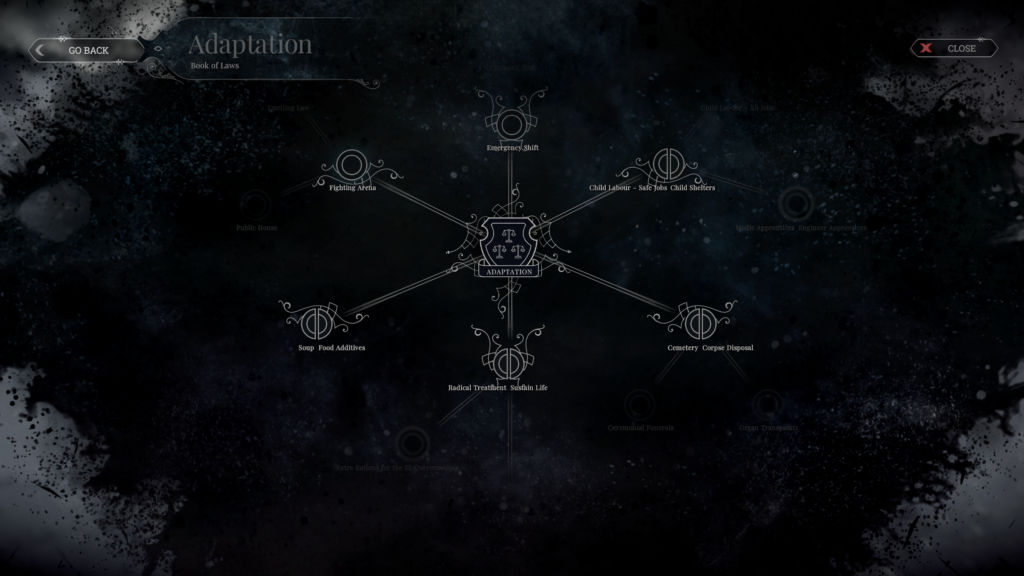
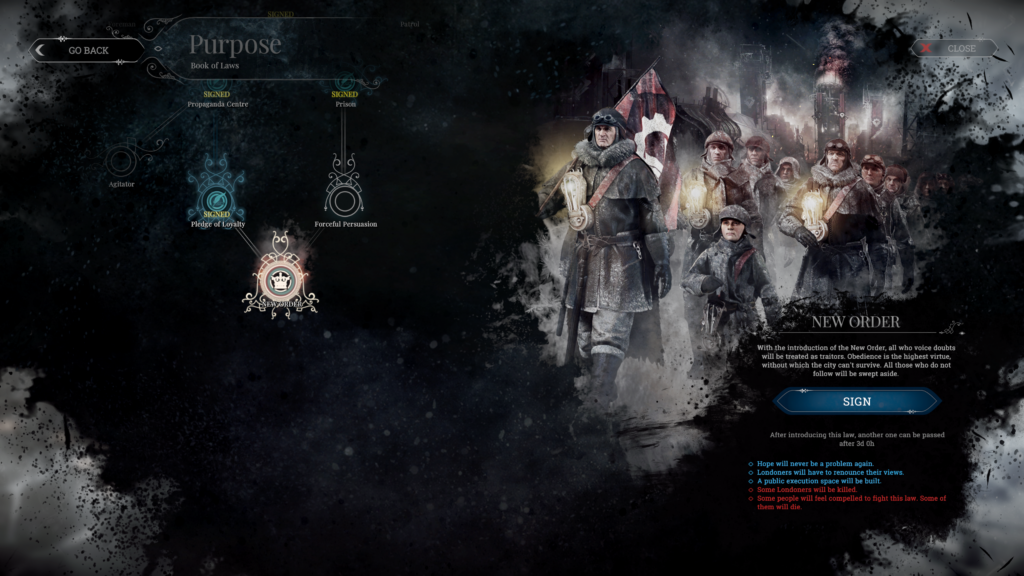
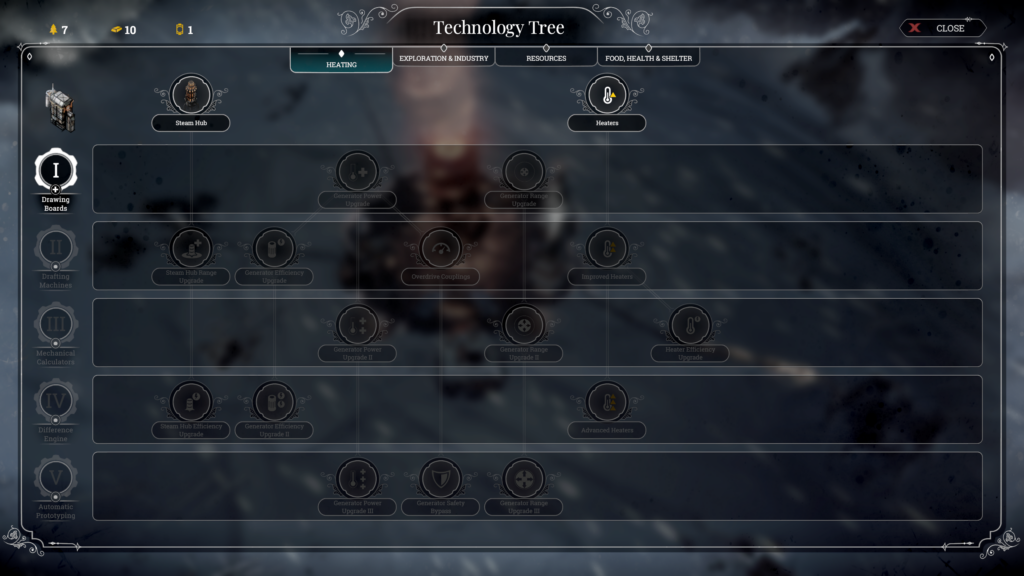
The game is in reality just a static puzzle disguised as a management and building game. Once you understand the mechanics that the game tries to hide from you it becomes trivial or incredible rigid at higher difficulties. This is the fundamental flaw of the gameplay and the game.
The laws you can implement in the game is really great from a thematic perspective, and it does make you feel a bit shit for putting children to work or putting sawdust in their food. I love how the game eventually goes into a controlling or religious society to keep hope up and discontent down. It really makes you feel like victory at any cost, and again it serves the theme and narrative so well. Like every other aspect of the game it falls apart once you look at it from a gameplay perspective where you simply have a very rigid path forward that is optimal and the correct choice.
The scouting mechanic is one of my favourite mechanics in the game. It always feels great to reach a new site with your scouts. It does not matter what you discover; resources, people and lore are all great rewards for exploring the wasteland. I enjoyed reading about how other groups handled the collapse of society, and I thought this was a great little way to add lore to the world in a very natural way.
The pop-up events where the people complain or make requests is a good idea that is not always executed well. I love this way of adding atmosphere and storytelling to the game. It gives you missions to complete, which is a good way to give you pointers throughout the game that also works as a narrative device. The problem with the execution means that you sometimes get very odd requests or complaints that makes no sense in the situation. They might complain about not having enough shelter, but they would rather protect their previous free-time than collect wood to build said shelter. Generally speaking the game suffers from dissonance, which is to say that the behaviour of the people does not match their reality.
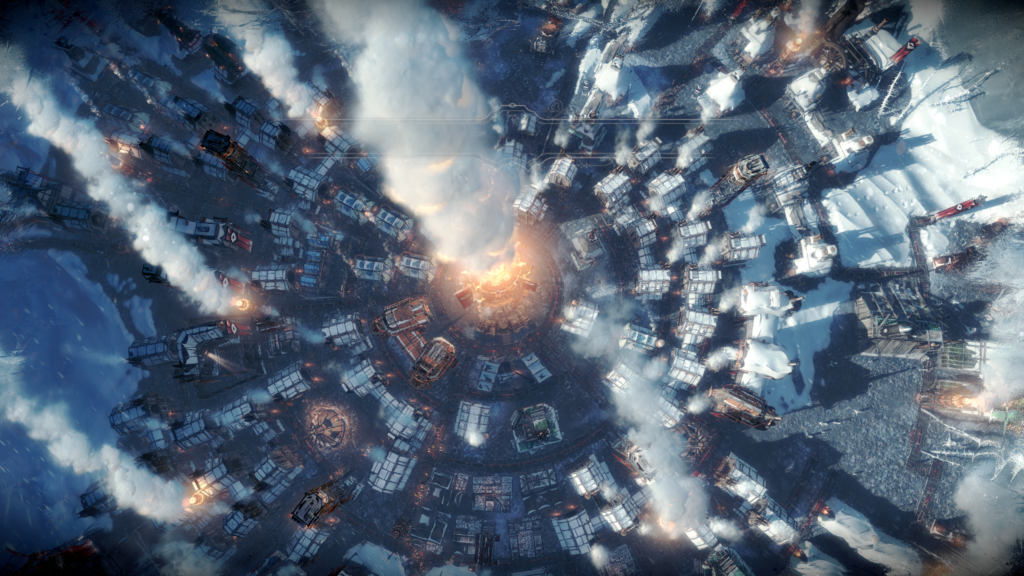
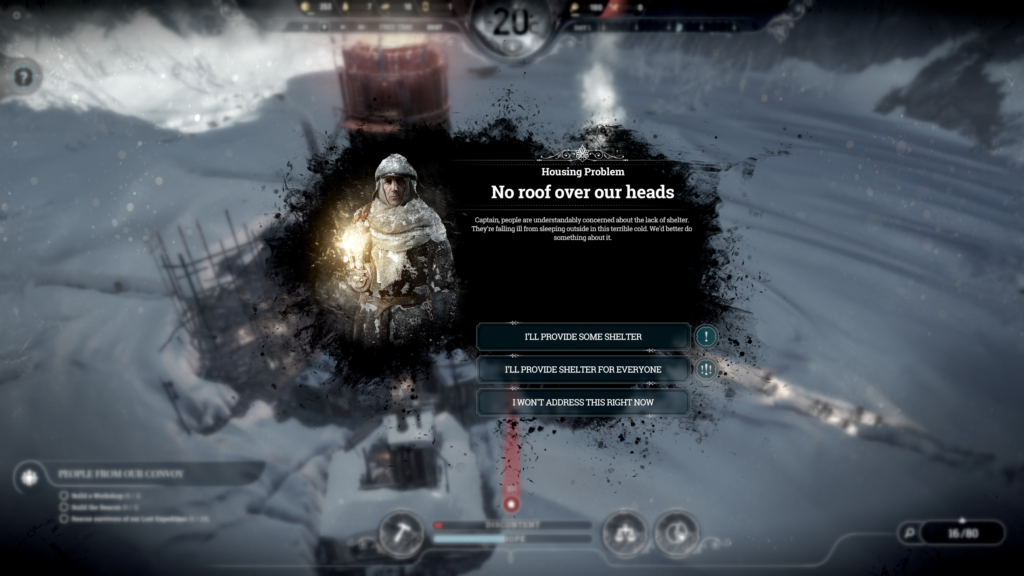
Discontent, hope and cold/heat-management are core mechanics of the game; they are the what decide if you succeed or fail. They are great as a tool to create tension for the narrative. The problem is that this only works if you are struggling and are trying to meet every need and have a hard time doing so. The second you stabilise the colony the tension of the game vanishes, and with it everything that makes the game worth playing. The game exists in a weird spot where it has to be perceived as difficult in order for the narrative to function. It is trying to juggle the difficulty scaling from start to finish such that you always feel that you are on the brink of failure.
This is where I think a more complex builder mechanic and more dynamic gameplay design would allow you to continue even though you have overcome the stabilisation of the colony and allows you to grow it and make it a true new home. This is what the game lacks.
I want to give the game credit for how it deals with it its difficulty sliders. It is really nice that they allow the player to adjust the different aspects of the game to fine-tune the difficulty to suit your own play-style.
Overall the game is very good at storytelling and incorporates gameplay, music and sound in a fantastic way and is what makes the game worth playing.